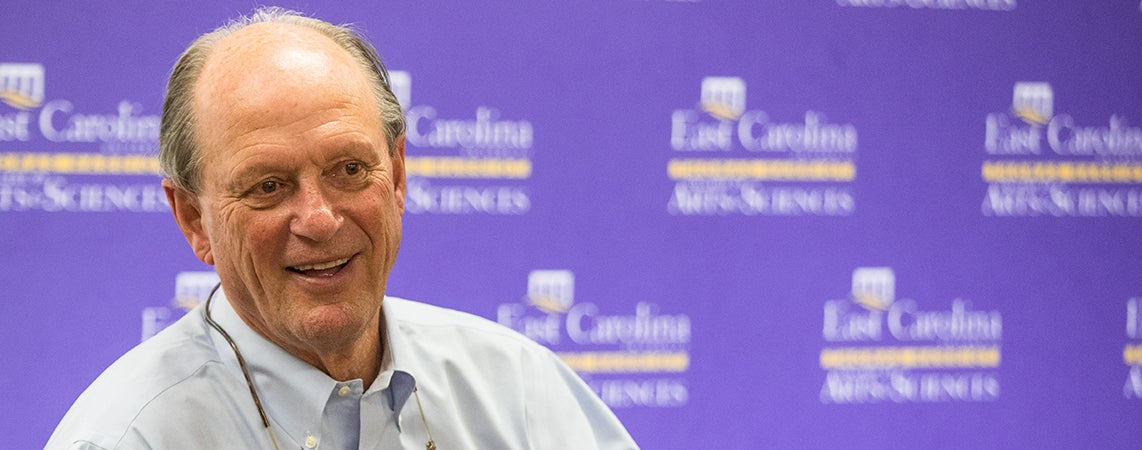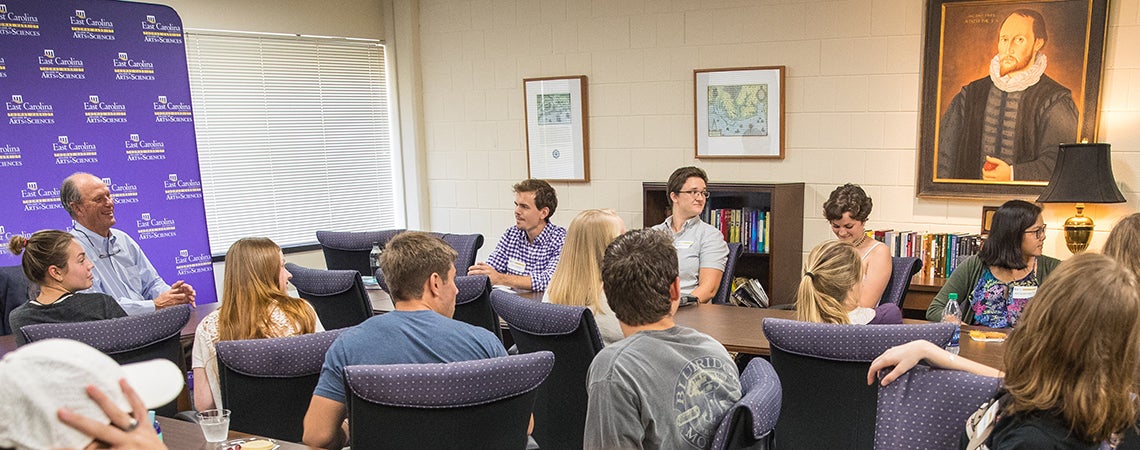OCEAN EXPLORATION
Robert Ballard speaks on oceanography, planet’s future
Oceanographer Dr. Robert Ballard kicked off the 2017-18 season of ECU’s Voyages of Discovery Series on Sept. 14 with a discussion on “Human History Under Water.”
During the event, Ballard talked about how he came to be an oceanographer and presented a brief overview of the oceans and their landforms, before discussing his passion and experiences of ocean exploration.
“I fell in love with the ocean because it was my playpen,” said Ballard, who was born in Wichita, Kansas, but who at a young age settled with his parents in San Diego, California. “I’ve always had a passion for exploration.”
“His entire career has been one long journey of discovery,” said Dr. Chris Oakley, chair of the Department of History, who introduced Ballard.
During the event, Ballard pointed out that 72 percent of the planet is underwater, and of the remaining 28 percent, 40 percent is uninhabitable. Ninety-five percent of the entire human population lives on less than five percent of the planet, and the Pacific Ocean alone covers one-third of the planet. He stressed that there is a major need to map and further explore the ocean.
“We have better maps of Mars,” said Ballard, who does not see Mars as a viable “Plan B” option for settlement. He sees ocean exploration and colonization as our future. His mission is “to go where no one has gone before on planet Earth.”
Due to population growth, there has been a loss of farmland for housing, and Ballard stated we have been turning to the oceans for some of our food. He said humans are now killing off 90 percent of the major predators of the sea including tuna, salmon, yellowtail and swordfish.
However, he said it is important that we move away from the hunter/gatherer society at sea, and like on land, become a herding society. He said our focus should not just be sustaining the life in the sea but increasing its reproducibility.
“I thought it was extremely interesting,” said Emily Gyba, ECU freshman and athletic training major, who attended the event. “He really helped me understand what was happening.”
Earlier in the afternoon, prior to the public event, Ballard visited informally with a group of approximately 24 ECU students. The students, whose majors ranged from athletic training, music education and engineering to anthropology, biochemistry, maritime studies and nursing, were able to ask about Ballard’s thoughts on the future of ocean exploration and other topics, including the Black Sea and its connection to the Christian Biblical story of Noah’s ark.
While meeting with the students, Ballard emphasized how they will develop their skills in college, but not to rush, because college also is a place to discover their interests. He compared college to going to a supermarket and tasting things; classes are different foods to taste and explore.
“It may sound terrible. Taste it, and you’ll be surprised,” said Ballard. “Things that I never thought I would want to take a course in, I took a course in, and absolutely loved.”
“So this is the time, as an undergraduate, to taste as many things as you can taste, and you will be surprised the ones you like,” said Ballard.
In the past 60 years, Ballard has conducted 150 explorations, including the discovery of the R.M.S. Titanic in 1985 and the German battleship Bismarck, and he said there are an estimated 3 million ancient ship wrecks yet to be discovered. He works with a team of researchers he calls his Corps of Explorers. The corps comprises 55 percent women in positions of leadership and a diversity that represents every type of human across America – his “United Shades of America,” said Ballard.
The group serves as role models and mentors for the next generation of scientists and engineers, and their ship-to-shore explorations may be observed in real time at www.nautiluslive.org. Students interested in learning more about interning with Ballard’s Corps of Explorers should visit www.oceanexplorationtrust.org.

Ballard spoke of the need to map and further explore the Earth’s oceans, which make up 72 percent of the planet’s surface area.
